Mr. Trump lost in Iowa in 2016, but this year's strong investment campaign and mistakes by his opponents helped the former president easily win the opening state.
Former President Donald Trump recently told dinner guests at his Mar-a-Lago estate in Florida about a haunting memory from the 2016 Iowa caucuses.
Ivanka Trump and her husband Jared Kushner appeared at a caucus in Des Moines to address Republican voters on his behalf, but found the Trump team there in disarray, with volunteers and staff operating in a disorganized manner.
“Dad, I don’t think you’re going to win. These people don’t know what they’re doing,” Trump recalled Ivanka saying on the phone that night.
Republican Senator Ted Cruz defeated Mr Trump in that day's caucus, prompting an angry call for a re-election. He accused Cruz of "stealing" the caucus.
But when Mr. Trump told the story to friends and aides late last year, it took on new meaning. He had accepted his 2016 defeat in Iowa and was looking ahead, determined not to lose face again.
“That was the only time I had a small defeat. But I learned a lot,” he told a crowd of supporters a few weeks ago in Ankeny, Iowa.
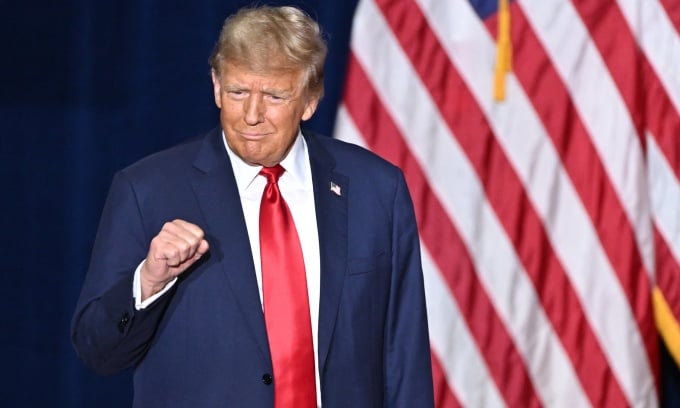
Former US President Donald Trump in Des Moines, Iowa, January 15. Photo: AFP
There was no repeat of that scenario in Iowa this year. Mr. Trump won 51% of Iowa’s vote in the caucuses on the evening of January 15, more than double his performance eight years ago. He led Florida Governor Ron DeSantis by 30 and former South Carolina Governor Nikki Haley by 32 percentage points.
After the first caucus, the Republican race was reduced to three candidates: Mr. Trump, Mr. DeSantis and Ms. Haley. Other Republican candidates such as businessman Vivek Ramaswamy and former Arkansas governor Asa Hutchinson announced that they would stop running and decide to support Mr. Trump.
For Trump, the night of January 15 was a stunning result. The former president proved he could succeed where he had seen failure. The result also proved Trump’s approach to the 2024 race was effective.
Mr Trump’s campaign has largely focused on DeSantis, the opponent they initially feared most. At least eight of Mr Trump’s campaign advisers have worked for the Florida governor.
Their goal was to make DeSantis uncomfortable. They mocked him for wearing platform boots because he was insecure about his height. The pastry chef at Mar-a-Lago made chocolates shaped like boots to serve to guests.
They also ran a sarcastic ad about DeSantis, in which a former staffer told the Daily Beast that the Florida governor had poor dining etiquette, even eating pudding with his hands on an airplane.
They know the Florida governor’s love of private jets, his love of luxury golf courses, his Florida rivals, and his quirks like avoiding human interaction. Trump’s team also knows the Florida governor’s addiction to Twitter (now X).
“He’s obsessed with Twitter and what influential conservatives are sharing. He’s always on Twitter to see what they’re saying. So we use it against him,” said one Trump adviser.
“It’s a strategy to lure DeSantis’ team into unimportant fights and keep them distracted by trying to respond to the trolls and taunts on Twitter,” said Alex Bruesewitz, an online consultant who works with Trump’s son, Don Jr.
DeSantis doesn't typically respond directly to such attacks, but people close to the governor say he's increasingly frustrated by them.
But the attacks on his opponents are only part of Mr Trump’s Iowa strategy this time around. His team is trying to do better than in 2016 by attracting more people to the caucuses.
They determined that Trump supporters loved items related to the former president. They made white hats with gold letters that read “Trump Caucus Captain” to give to campaign volunteers and created a cartoon character named Marlon to explain the caucus process via video. They conducted 300 volunteer training sessions.
Top volunteers were told that if they met their goals, they would get to attend a party with Mr. Trump in Milwaukee this summer.
Aides also urged the former president to attend small rallies to encourage caucus attendance, even though he preferred larger events. They explained that the 700 or 800 people who actually showed up to a caucus were worth more than the thousands who didn’t.
In a conference room at the hotel in recent days, Mr. Trump called 20 top volunteers who were surprised and delighted to talk to him on the phone.
As a snowstorm hit Iowa, campaign aides asked members of the “Farmers for Trump” coalition to use their tractors to clear roads leading to the caucus.
Last weekend, Mr. Trump also stepped up his campaigning and told supporters in Indianola on January 14 that nothing would stop them from showing up at the caucus on the evening of January 15.
Denise Nelson, a campaign volunteer, said the former president has a larger volunteer base than in 2016, when she first supported him. "It helps him a lot, especially when people are saying lies and fabrications about the former president. So I want to say thank you to them," she said.
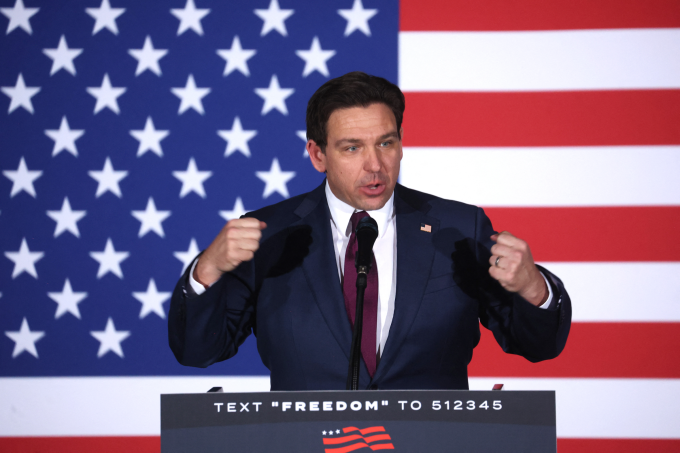
Florida Governor Ron DeSantis speaks in Des Moines, Iowa on January 15. Photo: AFP
Mistakes and discord in the campaigns of his opponents were also factors that helped Mr. Trump win easily in Iowa.
Ron DeSantis was once seen as a rising star in the Republican Party. Many initially thought he could be a good choice to replace Trump. He and his allies invested heavily in the campaign, organized many campaign events, and built a team to campaign door to door. He also received support from the popular Governor of Iowa, Kim Reynolds.
But as the final weeks approached before the primaries, his campaign became increasingly bleak as polls showed poor results.
Many of the Florida governor’s staff and associates acknowledge that DeSantis’s campaign was miscalculated from the start. DeSantis waited nearly 200 days after his landslide victory in the 2022 gubernatorial re-election to announce his White House bid, costing him time to campaign and giving his opponents an opening.
DeSantis’s last-minute decision to launch a campaign on social media platform X after talking to billionaire Elon Musk also failed to generate traction and disappointed donors and allies.
DeSantis started the campaign slowly and largely avoided conservative media like Fox News. DeSantis later complained that Fox News had abandoned him.
“He missed opportunities,” said a person close to the Florida governor.
Some of the donors Mr. DeSantis has bet on, like hedge fund mogul Ken Griffin, have expressed frustration with the Florida governor’s stance, including his increasingly right-wing views on Ukraine and abortion.
$20 million donor Robert Bigelow publicly complained about DeSantis’s decision to support a ban on abortions after six weeks. Bigelow later told Trump and his advisers that DeSantis never called to address his concerns. The Nevada businessman later switched his support to Trump.
Mr. DeSantis’s campaign failed to deliver an anti-Trump message that resonated with key constituencies, while Mr. Trump became the focus of media attention with four lawsuits and 91 criminal charges.
Even when Mr. DeSantis does a televised town hall, “half of it is Trump because the questions are all about him,” according to the Florida governor’s adviser.
“The Trump indictments have crushed us,” said one person who regularly chats with DeSantis. “We even joke that he needs a prison photo to compete with Trump.”
Last summer, Mr. DeSantis’s campaign was on the brink of running out of money. He was criticized by some close to him for using private jets while cutting other expenses, leading to a reshuffle of his entire campaign plans.
The campaign was run by a number of different consulting groups, including Axiom Strategy, GP3, and a group in Tallahassee. Internal conflicts were rife, and no one took responsibility when problems arose. At least two directors, a board member, and other staffers at the pro-DeSantis super PAC Never Back Down have resigned or been fired.
The internal turmoil in the campaign has cost DeSantis. His opponents have spent millions on television ads exposing the discord, undermining his campaign message.
DeSantis tried to be optimistic. In the days leading up to the Iowa caucuses, he still predicted he could win, with the support of Governor Reynolds and evangelical leader Bob Vander Plaats. However, the Florida governor ended up with just 21.2% support.
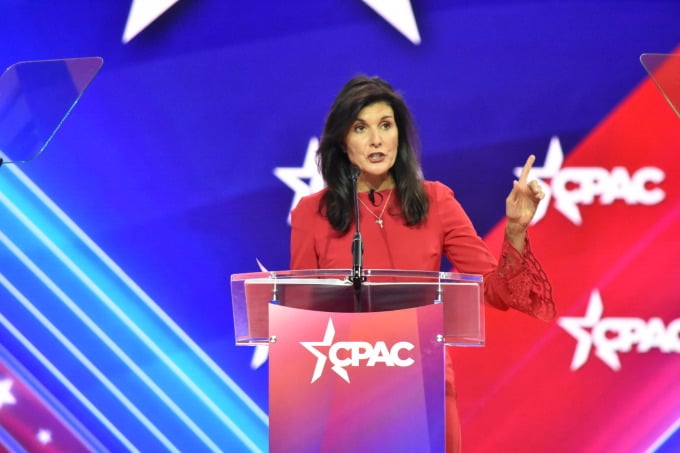
Nikki Haley speaks at CPAC, National Harbor, Maryland, USA in March 2023. Photo: AFP
Unlike the Florida governor’s campaign, former U.S. ambassador to the United Nations Nikki Haley’s campaign is led by a group of friends and former associates, which helps it operate more cohesively. While DeSantis focuses on policy, Haley emphasizes big themes like generational change and political style.
She doesn’t spend much money, flying commercial for months at a time, sometimes with just one adviser. While DeSantis’s campaign rents three buses for travel and advertising, Haley doesn’t have one.
But her campaign has also been plagued by missteps. Haley drew criticism for failing to mention slavery as a cause of the 19th-century American Civil War. She has also struggled to expand her coalition beyond moderate, wealthy, college-educated voters. When former New Jersey Governor Chris Christie dropped out of the presidential race, he still refused to endorse her and predicted she would “lose miserably.”
However, Ms. Haley received support and financial backing from many major donors who saw her as the last hope against Mr. Trump. Among them, the support of billionaire Charles Koch and the political advocacy group Americans for Prosperity Action (AFP Action) was seen as a heavy blow to DeSantis.
In the final weeks before the primary, Haley spent nearly $1 million more on television ads in Iowa than DeSantis, while continuing to promote her image in New Hampshire, the next primary contest.
AFP Action knocked on 250,000 doors in Iowa from November 28 to the caucuses to call for support for Haley, and activated its campaign network in the next primary states.
"Who can win the nomination and beat President Joe Biden? For us, Nikki Haley is the only candidate who can do both," said Tyler Raygor, director of AFP Action.
However, all those efforts only brought her to third place in the Iowa caucuses on the evening of January 15.
"Trump is not a candidate, he is the leader of a national movement," former US House Speaker Newt Gingrich stressed. "No one understands what it is like to confront a movement leader. That's why the mounting legal troubles only anger his movement and increase the anger in an incredible way."
Thanh Tam (According to Washington Post, Reuters, WSJ )
Source link








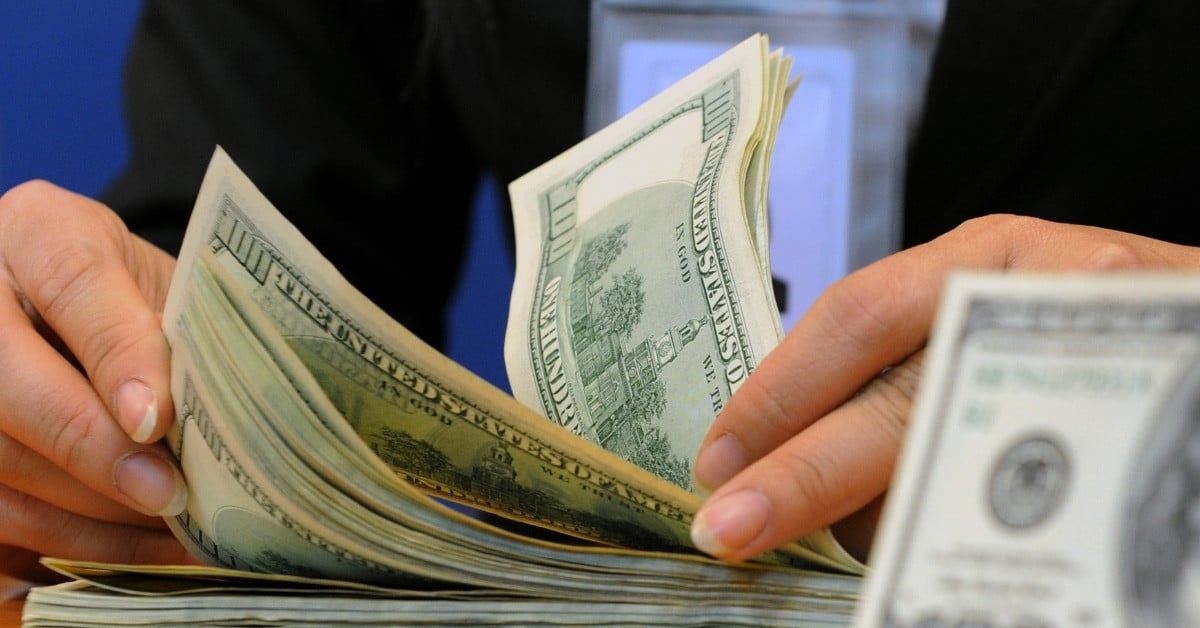







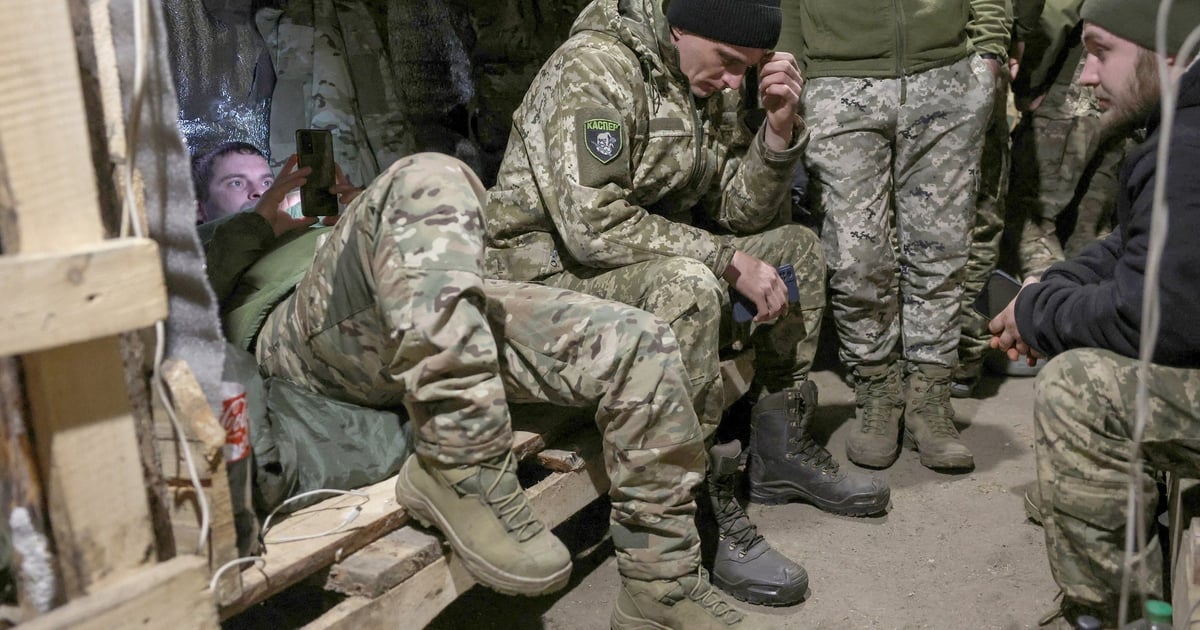



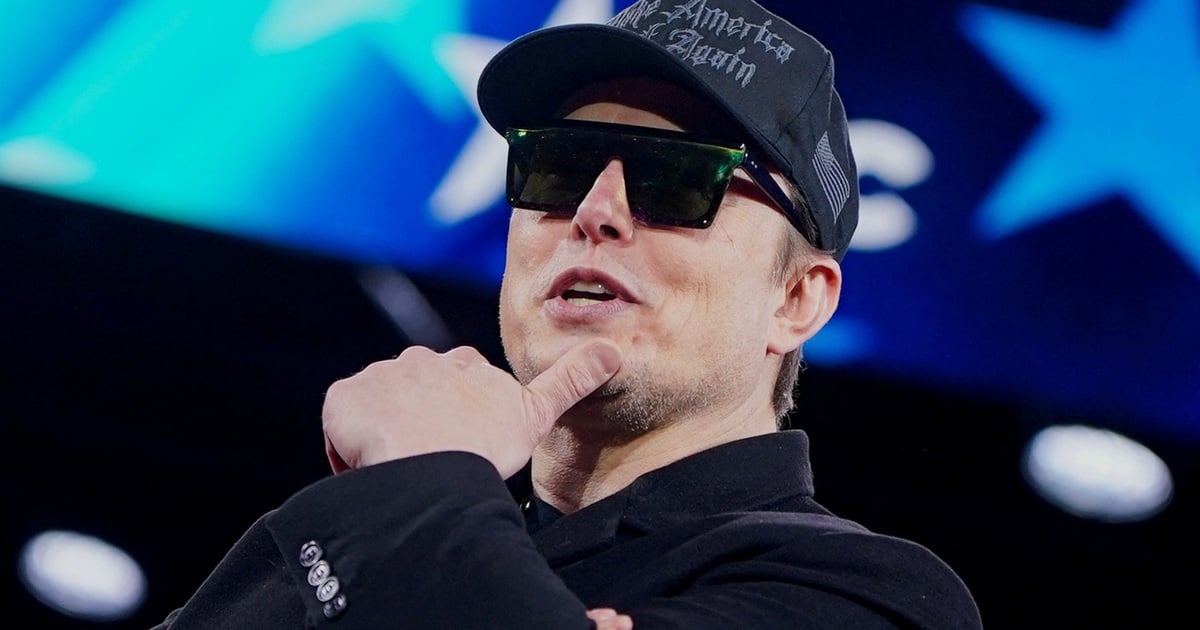
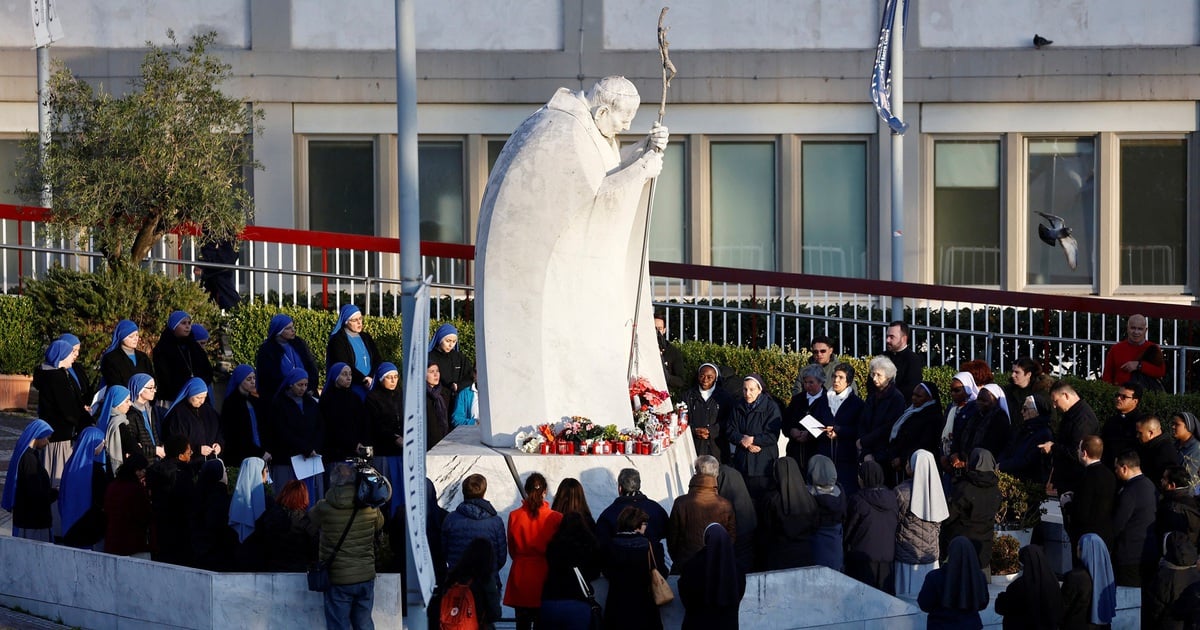
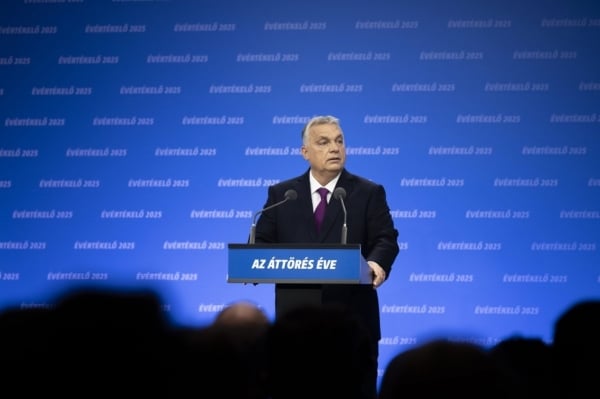
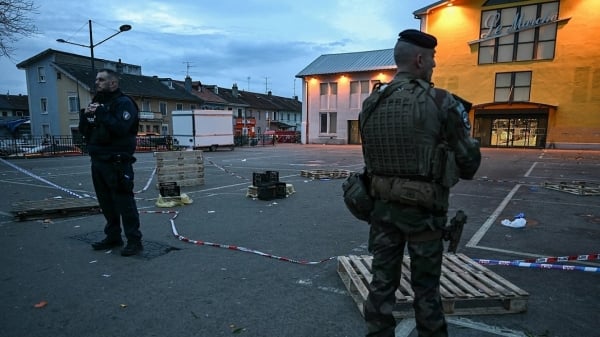















![[Photo] Prime Minister Pham Minh Chinh chairs Government Conference with localities on economic growth](https://vstatic.vietnam.vn/vietnam/resource/IMAGE/2025/2/21/f34583484f2643a2a2b72168a0d64baa)




























































Comment (0)